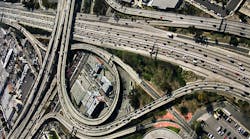The American Society of Civil Engineers on March 9 assigned a grade of “D+” to the quality of U.S. roads, bridges and other infrastructure. The grade reflects the fact that the infrastructure is “in fair to poor condition and mostly below standard, with many elements approaching the end of their service life,” as reported by Bloomberg.
The group estimated that there’s a gap of more than $2 trillion between projected current funding and the $4.59 trillion it would take to improve U.S. infrastructure to a “B” grade by 2025.
This poor grade is of no surprise to the steel industry. “The roads, highways and bridges that enable the transport of steel are suffering from a lack of investments that are threatening commerce and global economic competitiveness,” commented Thomas J. Gibson, CEO of The American Iron and Steel Institute (AISI).
“The steel industry is not only a user of the highway system, but our products serve as key components in the construction of the system. In order for our economy to remain internationally competitive, a strong commitment to robust infrastructure spending --which includes long-term transportation funding -- is critical.”
How the improvements will be funded is of concern to the The International Bridge, Tunnel and Turnpike Association (IBTTA) which offered the following response to the report:
“The ASCE report card points out that we invest only 2.5% of GDP in infrastructure and that we need to ramp that up to 3.5% of GDP. To get there, we need courageous leadership from the president and Congress. Nothing else will be sufficient to convince the American people that we need to invest more – now. At IBTTA, we are proud of the fact that tolling is one of the most powerful and effective tools to ensure that our tolled highways, bridges, tunnels, and managed lanes are well maintained and have the capital they need to make continued improvements.
“The International Bridge, Tunnel and Turnpike Association and its members stand ready to work with the Administration and Congress to rebuild our infrastructure, strengthen our economy, and improve the lives of all Americans.”
Also calling on the government to do something about this situation, the American Association of State Highway and Transportation Officials (AASHTO) had this comment. “The grades in the ASCE Report Card provide yet another example of what occurs when a nation underinvests in the critical infrastructure systems that support economic development and quality of life,” said Bud Wright AASHTO Executive Director .
“The FAST Act, signed into law in 2015, provided a modest increase in federal investment over five years, but it did not solve the long-term funding issues that threaten the future of America’s highway, transit and passenger rail programs,” Wright added. “The call for greater infrastructure investment began on the campaign trail and it continues in Washington today. It’s our hope that this report card will help turn that talk into action, prompting lawmakers to pass new legislation to provide long-term sustainable funding for America’s highway and transit programs.”
The International Bridge, Tunnel and Turnpike Association addressed the role that the government needs to take. "We need courageous leadership from the president and Congress," the group said. "Nothing else will be sufficient to convince the American people that we need to invest more – now. At IBTTA, we are proud of the fact that tolling is one of the most powerful and effective tools to ensure that our tolled highways, bridges, tunnels, and managed lanes are well maintained and have the capital they need to make continued improvements.
Help is on the way from the government as President Trump has already called for an initiative to steer as much as $1 trillion in public and private funds to U.S. infrastructure over the coming years. Trump has not made the details public but has said that it will be “financed through both public and private capital,’’ including with public-private partnerships,” according to Bloomberg.
This investment is seen by some, in particular the AFL-CIO as more than than “just repairing and modernizing our roads, bridges, ports, airports, rail and transit systems. The investments that need to be made are also about growing our economy and creating good jobs for the Americans who need them most.”
The group points out that for every $1 billion invested in transportation infrastructure, more than 21,000 jobs are created across multiple sectors of the economy, including operations, maintenance, construction and design.
“When paired with strong Buy America laws that require transportation components, like train cars and buses, be American made, job creation is maximized.”



